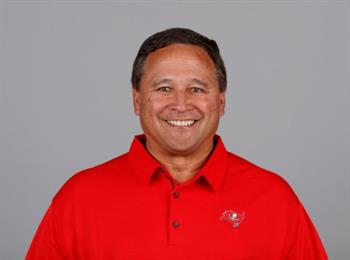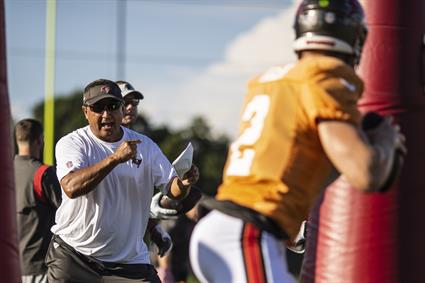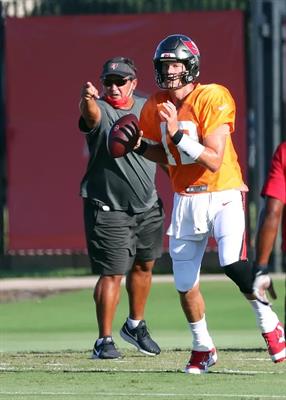This article appears in the Fall 2021 edition of the FCA Donor Publication. The FCA publication is a gift from our FCA staff to all donors giving $50 or more annually. For more information about giving, visit here.
Thanks to a Kiwanis scholarship for LA County students, high school sophomore Clyde Christensen found himself boarding a bus to FCA Camp in Santa Barbara. It was 1972. He considered himself a believer since he’d been raised in a Christian home by a minister, but something happened during Camp that changed his life forever.
“Revival broke out… and I submitted to live for Christ,” he said.
 Following high school, Christensen became an All-American quarterback for Fresno City College before joining the North Carolina Tar Heels. While playing collegiate ball, he sensed God calling him to coaching. In 1979, he began coaching at Mississippi as a graduate assistant and worked with several teams in the years that followed. In 1996, he joined the NFL and began coaching with his brother in Christ Tony Dungy in Tampa Bay. Over the years, football has taken him to dozens of cities where he’s served in a variety of coaching roles. Everywhere he’s gone, his connection to FCA has remained strong.
Following high school, Christensen became an All-American quarterback for Fresno City College before joining the North Carolina Tar Heels. While playing collegiate ball, he sensed God calling him to coaching. In 1979, he began coaching at Mississippi as a graduate assistant and worked with several teams in the years that followed. In 1996, he joined the NFL and began coaching with his brother in Christ Tony Dungy in Tampa Bay. Over the years, football has taken him to dozens of cities where he’s served in a variety of coaching roles. Everywhere he’s gone, his connection to FCA has remained strong.
Coach Clyde, as many call him, has impacted hundreds of players and coaches, several of whom are considered to be the greatest of all time. But his players consider him to be one of the best, as his approach to coaching has changed their lives. Payton Manning said of Christensen, “He’s one of my favorite coaches of all time,” and Tom Brady, who Christensen currently coaches in Tampa Bay, says he’s “one of the finest, kindest people he’s ever met in his life.”
Everywhere he goes, this Super Bowl winning coach is pursuing impact by pouring his heart into building relationships and sharing his love of Christ.
"If you care about your players and you're relational in your approach, the Lord can do some neat things."
- Coach Clyde
You have coached some incredibly high-profile athletes (and made a great call in bringing Tom Brady to Tampa Bay!) How do you approach coaching men who are recognized as some of the greatest to ever play the quarterback position?
It’s a privilege to do it, and it's really fun. I've used the analogy that coaching quarterbacks is like coaching thoroughbreds. There's a ton of pressure and there's a ton of demand on you. The players who are really great at their positions are really, really fun. My job is to help them do what they do best. They're wired a certain way. It’s really fun to coach high achievers, but it's not easy. Some people may think, "Well, coaching Peyton Manning and Tom Brady is the easiest job ever.” That's not necessarily the case. But it really is rewarding, and I really enjoy it. My focus is on relationships and making sure they know I care for them.
What’s something about top quarterbacks that you see, but not everyone else gets to see?
There's no such thing as big time. We’re all just little men with a big God. We all have needs and we all wrestle and struggle to become what we're supposed to be. It can be a lonely position when everyone thinks you have it all together because your bank account's large or because you're an NFL quarterback. This has been a fertile field for me to show care for my players and build relationships with them. It takes time, especially the higher you go. The top athletes can be less trusting because so many people want something from them. That's been a challenge but I’ve told myself, “Whatever it takes… it may take 10 years, it may take two years, it may happen overnight, but I’ll be authentic and genuine with them.” If you care about your players and you're relational in your approach, the Lord can do some neat things.
"It’s always been way bigger than football."
What impacted your perspective and influenced you to see coaching as a ministry?
I had a great mom and dad; my parents adopted me and my dad was a pastor. Adoption itself—taking someone in and making them your own—has flowed into how I coach. I got into it because I cared about people and I had a heart for young men. Athletics has been a fun place to serve God, but I would be caring for people no matter what I was doing. My calling to coach isn’t any more or less important than any other profession, but it's what God called me to do. When I see it this way, there's a humility to it, and I’m able to stay focused on caring for whomever God brings across my path whether it's Tom Brady or the third string quarterback at Holy Cross.
You took over the chaplain role in Tampa Bay last season, spiritually leading the Super Bowl winning team. What were some of the lessons you focused on with the players during last season?
It wasn't a job I signed up for, but Coach Arians said, "Hey, I want you to do it." He wanted to keep things in-house. I felt like my plate was full with coaching quarterbacks, but I saw the opportunity as something God-given. He provided at every corner and worked out all the details from chapel speakers to Bible studies. I wanted to encourage the players to get into the Word because any time we can get people into the Word of God, God does the rest. I wanted to get them exposed to great Bible teaching and get them familiar with their Bibles.
Right now we probably have 25 guys reading through the Bible in a year, which we started a long time ago with Coach Dungy. It opened up relationships for me with the defensive guys who I didn’t know as well. We also have our coach's Bible study, and there's probably 15 or so guys who meet up every Friday morning. That's been neat. We read the gospel of John and now we're in the middle of Acts.
I saw my job as getting people exposed to the Word of God and letting the Spirit do the work in folks’ hearts. I’m still hoping we bring on a full-time chaplain, but until then, I’ll be faithful.
 You coached with Tony Dungy for many years of your NFL career, and you two remain good friends. What has he taught you about being a Christian coach?
You coached with Tony Dungy for many years of your NFL career, and you two remain good friends. What has he taught you about being a Christian coach?
I've learned you need some brothers who see life in the same way you do. Coach Dungy and I forged a great friendship because we were young coaches figuring out how to be husbands and fathers at home as well as coaches. We both have a heart for finding God's way.
Finding a balance while coaching isn’t easy. It’s hard work and there were an awful lot of times I thought I was failing at home and work—not doing anything well. It was nice to have a brother who understood a coach’s life. We took long walks together and prayed about our families. We vacationed together.
In '95, he called and said, "Hey, I think I'm going to get this Tampa Bay job, let's go. I want you to come with me and I feel like we can have an impact in the NFL and in the city. Who knows, maybe even the nation through this coaching platform God's given us."
Sure enough, we did come down here to Tampa and he certainly had that kind of impact. It has been neat to see what God has done with a couple young coaches who wanted to be His man in our profession and who saw coaching as a calling and not simply an occupation or a way to earn a living. It’s always been way bigger than football.
You’ve mentioned before that FCA has made a transformational impact on your life and in your marriage and family. Can you share a bit about this? How has FCA impacted your life?
I submitted to live for Christ at FCA Camp. I started going to FCA conferences at Black Mountain FCA Camp around '77 or '78 and I haven’t missed one since. I went as a Huddle leader, then as a coach, then as a married couple, then as a dad. Now, I take my grandkids. Two of my daughters met their spouses at Black Mountain. FCA has had a significant impact on me.
 I see coaching as one of the highest callings you can have and FCA's provided a platform and arena to support me as I've followed God with my life. I've probably moved 13 times over the years but each time I've moved, the Lord's provided FCA, a church, and folks who support us. When I go to a different town, I find the local FCA because I know the staff will have a heart for coaches. FCA has provided a family wherever we've gone.
I see coaching as one of the highest callings you can have and FCA's provided a platform and arena to support me as I've followed God with my life. I've probably moved 13 times over the years but each time I've moved, the Lord's provided FCA, a church, and folks who support us. When I go to a different town, I find the local FCA because I know the staff will have a heart for coaches. FCA has provided a family wherever we've gone.
You’re not only involved with FCA, you are also invested financially in the ministry. Why do you choose to support the ministry?
The Kiwanis invested in sending a young punk from Covina, California to FCA Camp and it was a life-changing experience for me. Sometimes you can’t always see the impact of your gift, but you can trust that lives are changing at FCA. FCA shares Christ in the public schools. I don't think there's a better investment than into coaches and athletes in high schools, and especially public school campuses. If all of a sudden, you get a Christian coach on that team, he or she can change that whole campus. If you get a couple of Christian athletes who catch a vision, they're already built-in leaders on their campuses, and they can create a huge impact. You're not going to get a full-time minister on these campuses but you can find a Christian coach or athlete. By supporting FCA, you’re helping support and encourage them.
"FCA has provided a family wherever we've gone."
What would you say to someone who is interested in pursuing a career in football while also living out his or her faith?
The starting point is on your knees and your personal relationship with God. We all have plans for our lives but sometimes being quiet to see what God does and having patience is most important. People can be so anxious to get into coaching and they want to start in the NFL. But if I had started in the NFL, I wouldn't have had the foundation I needed. As I started coaching all the way up, the Lord took me on a journey and He prepared me for different things. We can get too impatient with the level we're at or the pay scale.
The Christian coach says, "I yield my life and whatever level You want me to coach, in whatever city You want to take me to, whatever You ask me to do… that’s what I signed up for.”
Be faithful to what God’s given you to do today, do it well, and see what God does with it. It may be to disciple young kids, it may be to start a Bible study in your neighborhood, it may be to start a Bible study on your staff. Usually when we prove ourselves obedient, all of a sudden, He will supercharge it with His Spirit and His presence, and you’ll have something special on your hands.
 You’ve said before that high school coaches are the highest-level coaches in the profession. Tell us more about that.
You’ve said before that high school coaches are the highest-level coaches in the profession. Tell us more about that.
I probably didn't have what it took to be a high school coach, and maybe God put me in the NFL so I could be a cheerleader and an encourager to high school coaches. They’re doing the work and they're embedded on high school campuses.
I'm much more interested in 2 Timothy 4:8, which is the crown of righteousness, the one the righteous judge will place on our heads. Trophies, what happens down here on earth, accomplishments and all that stuff is far less important than winning that crown that’s won by a faithful life.
You never know the impact you're having, especially in coaching. Sometimes you’re sowing seeds and you do it year after year after year. Each season brings different players across your path and you need patience and trust that you’re doing God’s work. Keep sowing seeds. Trust me: it will pay off.
Even now, I have kids who I coached 25 years ago show up and say, “Hey, I just want to reach out and let you know God's grabbed ahold of my life and I remember that you used to encourage us in Bible study and try to get me to church."
Even if you feel like all you can show for your day is football, remain faithful.
Looking back at a career of coaching, what’s something God’s shown you that you’d want other coaches to know?
There have been as many firings, demotions and setbacks in my life as there have been Super Bowl trophies. There have been lonely times when I wasn’t sure if I was doing the right thing or if I’d find another coaching job. I'm grateful because I’ve seen God’s faithfulness and I’ve learned how to trust Him.
Exodus tells us God let the Israelites wander to humble them and test their hearts to see if they’d be obedient. This has held true in my life. Coaching has plenty of pieces of humble pie, whether it be losses, firings, changes of jobs or rejection and criticism by the public. But I’m grateful for those hard things.
Years ago, Coach Dungy and I got fired together at Tampa Bay and the Lord sent us up to Indy. All of those things have been just as important—or more important—than the victories and what has gone well in the journey.
Years ago, I was in Miami as an offensive coordinator and got demoted. My office was moved to the copy room, and it was humiliating and tough. But in that little copy room, God showed up. That was the richest time with the Lord I've ever experienced, and it was also the most fruitful ministry I've ever experienced. Now, I praise God for the copy rooms of life as well as the Super Bowls. I wouldn’t trade that year for anything in my life.
Sometimes people go, "Gosh, I want to be a coach and I want to have a life like Coach Clyde and win the Super Bowl." But that's not the whole story. That’s just a small part of the story. It would be a miss if people thought this thing was about Super Bowls and the Mannings and Bradys of the world... it would miss the journey, which is the most important part.
-FCA-
Photos courtesy of Tampa Bay Buccaneers and Clyde Christensen